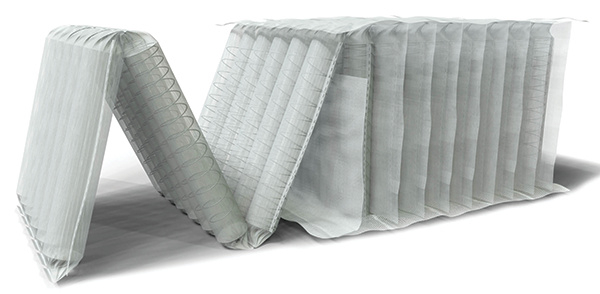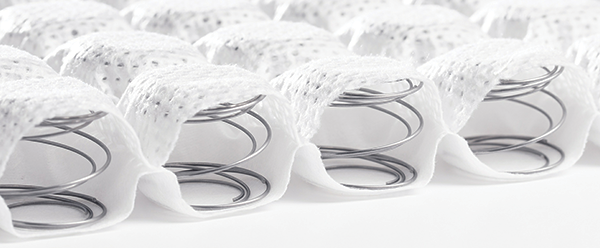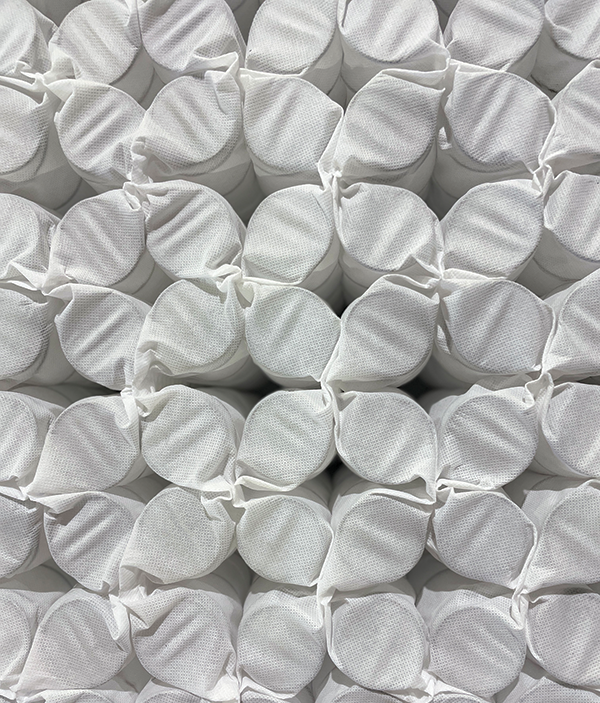Knowing that pocketed spring units are difficult to break down at end of life, springs producers are redesigning their products to keep them out of landfills and make recycling their components easier and more cost effective.
A key strategy is eliminating the glue that can contaminate the fabric encasements and make them less valuable in commodities markets.
One part of a sustainability story

Leeds, England-based Harrison Spinks prides itself on being an industry leader in sustainability, as does its springs division, Spinks.
All of the products Spinks supplies to the bedding industry are now Cradle to Cradle bronze certified, “all being completely glue-free, and they have gone through a rigorous process to be assessed for material health, product circularity, clean air and climate protection, water and soil stewardship and social fairness,” says Darren Marcangelo, managing director for Spinks. “It’s a certification we are extremely proud of, and we believe we are the only coil manufacturer in the world to be certified.”
The company’s pocketed spring offerings use ultrasonic welding instead of glue to affix the fabric pockets. Its line includes microcoils, which were designed with another sustainability goal also in mind: replacing comfort layers traditionally made with petrochemicals. The company also offers Flexecore, a “full height” pocketed coil.
Last fall, Spinks introduced Micro3D+, which are coils wrapped in polyester with a polyester 3D spacer knit. Micro3D+’s key selling point is the comfort the coils offer sleepers, but “ensuring this product was as sustainable as possible was key during its development,” Marcangelo says. “Being made from only polyester and steel enables easy separation at the end of life.” Micro3D+ is currently available only in the United Kingdom but the company expects to offer it more widely.

(Spinks has a partnership with Hickory Springs Manufacturing, based in Hickory, North Carolina, to offer its microcoils and Flexecore units in the United States.)
“Ever since we invented and started supplying our microcoils into the mattress industry, the goal was to replace comfort layers that were typically made from petrochemicals. (It was) mainly for durability and additional comfort, but it was also due to them being more sustainable as they are easy to recycle being made of only steel and nonwoven and without the use of any glue,” Marcangelo says.
Looking to the future
Martin Wolfson, owner and CEO of Texas Pocket Springs in Alvarado, Texas, began worrying about the problem of recycling pocketed springs units several years ago. He’s an evangelist for the spring system, believing pocketed coils are far superior to, say, a typical Bonnell spring, but Wolfson knew they were more complicated to recycle, especially when compared with traditional springs.
To see what would become of a used pocketed spring unit in north-central Texas where his company is based, Wolfson took one of his spring units to the local landfill and asked how the workers would dispose of it. The short answer: It would be dumped on top of a garbage pile.

“I thought to myself, ‘Wow. This is what we’re making, and if we don’t make a change, at some point, they aren’t going to accept these in the landfill anymore, and I’d be investing in a business that has a very short lifespan,” Wolfson says.
“So,” he continues, “that was the motivating factor to develop an innerspring unit where we didn’t use any glue,” making it easier to dismantle the unit and reduce contamination of the fabric encasement.
Texas Pocket Springs created its own pocketed spring assembly machine. “We are now on our third generation of the assembly machine, each one doing a better job, producing a more consistent product and doing it faster,” Wolfson says.
The GenEco Pocket Coil Assembly System, or GenE for short, originally used ultrasonic welding but the latest version relies on resistance heating (also called ohmic or joule heating), a process Wolfson says is less expensive than an ultrasonic system and more efficient because operators can better control the heat. The GenE takes about three minutes to assemble a queen-size spring unit. Wolfson aims to get that time down to two minutes, he says. The machine is currently available for sale outside the United States.
Texas Pocket Springs offers glueless versions of its flagship QuadCoil series of pocketed coils that include zoning and other features, and Wolfson believes the entire pocketed spring market is moving toward glueless constructions. “I believe that’s it’s the only way to make a spring,” he says.




